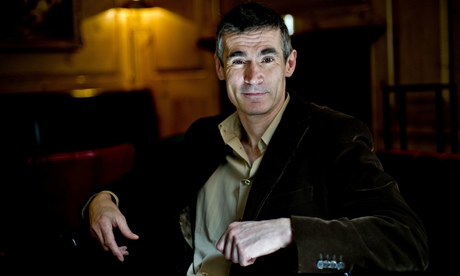
Andrew Miller has always been a bold writer, which often means avoiding the obvious or easy path. After the success of his historical novel, Pure, which won the 2011 Costa prize, readers might have expected him to produce something in a similar vein. Instead, he has returned to a contemporary setting for his seventh novel, The Crossing, and a protagonist even more at odds with her surroundings than Pure’s young engineer Baratte in pre-revolutionary France.
Tim and Maud meet at Bristol University’s sailing club; before their courtship has begun, Tim watches Maud fall 20ft on to concrete from the deck of a boat in dry dock, then – miraculously – stand and walk. In this moment she acquires a mythological status: “Who else has entered his life like that? Has entered his life with the force of myth?”
They buy a boat together and restore it; later comes a house and a child. As their relationship progresses, Maud remains elusive, not only to Tim but also to the reader, her inner life determinedly opaque. This self-contained, unknowable quality is apparently the source of Maud’s magnetism to men, but – to this reader, at least – it renders her at best infuriating, at worst dull. The little direct speech we have of hers is almost entirely monosyllabic; she is a talented scientist who has few interests outside her work and sailing, and finds it hard to engage with their friends or their daughter. “There are moments when he believes that in the last six years he has learned nothing important about her at all, nothing that shows her to him.”
It’s a high-risk strategy for a novelist to build a story around a character who remains so stubbornly inscrutable, though Maud shares traits with characters from Miller’s earlier books: the surgeon James Dyer from his debut, Ingenious Pain, who is incapable of feeling pain (Maud is engaged in the research and development of a new generation of painkillers), or Alec, the emotionally stifled protagonist of Oxygen. For the first two-fifths of the book Maud is mediated to the reader through Tim, her way of being never explained. Someone hints that she might be “on the spectrum”, but this is never explored or mentioned again. Then tragedy strikes – a tragedy that Maud at first weathers with apparent equanimity, finally alienating her from Tim and his family, until one day she returns to their old boat and sets sail alone across the Atlantic.
At this point, the novel changes tempo entirely, from a closely observed family drama to a meditation on solitude, human frailty and the forces of nature. Miller writes with the precision and beauty of a poet, not only when he turns his eye on sky and sea, but also in the practical details of sailing a yacht; technical terms grow rich and sensuous through repetition, taking on the quality of a litany. Yet still Maud refuses to yield her inner life; the reader sees her only through her actions: “A hermit in her floating cell, a pilgrim, an exile, a woman out of a Book of Hours who works her life like a garden, who suffers in it if necessary, who rarely looks up.”
There is a mesmeric quality to Miller’s prose in this sea journey, but he has not made life easy for the reader, and those who prefer at least some narrative resolution may find it difficult to engage with the later sections. If the novel feels unsatisfying, it is largely because Maud, being unknowable, is also, ultimately, unmemorable; she slides off the reader’s imagination like water from the deck of a boat, leaving barely a trace.
The Crossing is published by Sceptre (£18.99). Click here to order it for £15.19

